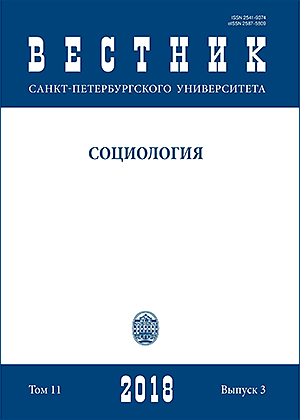Marital relations in the interethnic family
DOI:
https://doi.org/10.21638/spbu12.2018.305Abstract
The article is devoted to the peculiarities of marital relations in the interethnic family. At the beginning of the article the author analyzes the change in the traditional functions of the family as society is modernized, paying special attention to the change in the position of the woman in the family towards equalizing the rights and duties of both spouses; a reduction in the number of patriarchal families with a traditional distribution of “male” and “female” family roles, as well as the development of a nuclear partnership family. In the author’s opinion, it is especially important to study mixed ethnic groups in terms of the impact of cultural diversity on the socialization of children, satisfaction with marriage and the level of conflict as compared to a monoethnic family. It was such families that were the focus of research, the results of which are analyzed in the article. The motivation for entering into an interethnic marriage is discussed separately, the motive was an emotional attachment, and for families of both types — interethnic and monoethnic. As it turned out, between the groups of interethnic and monoethnic families there are no significant differences in the indicators of satisfaction and conflictness — in both groups the spouses are satisfied with their marriage, families have a rather low level of conflict. Spouses from monoethnic families share an egalitarian model of marital relations to a greater extent than spouses from interethnic families more often committed to the traditional model. However, they both share the same opinion that the strength of the family does not depend on the nationality of the spouses.
Keywords:
marital relations, interethnic family, family functions, nuclear family, motivation, cultural diversity, emotional attachment, egalitarian model of marital relations, the traditional model of marital relations, satisfaction with marriage
Downloads
References
References
Downloads
Published
How to Cite
Issue
Section
License
Articles of "Vestnik of Saint Petersburg University. Sociology" are open access distributed under the terms of the License Agreement with Saint Petersburg State University, which permits to the authors unrestricted distribution and self-archiving free of charge.




